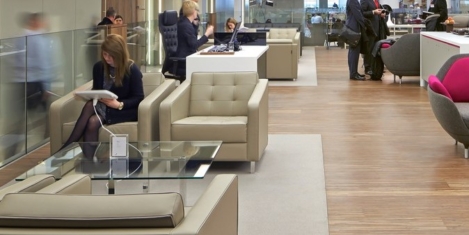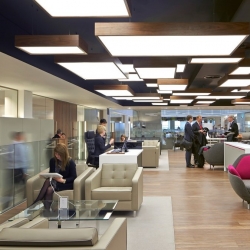June 16, 2021
Seminar will explore the route to a great workplace culture
 The events of the past 16 months have focussed attention on how we best bring people together to work, collaborate and learn from each other. That is why workplace occupancy and collaboration technology specialist Jooxter has curated a new webinar to help firms understand the challenges and opportunities they have in the new era of dispersed collaborative work. The webinar will explore how they can best bring people together, offer them a world class workplace experience and achieve great results. A panel of experts will discuss the evolution of hybrid working and how to create a team culture for better collaboration.
The events of the past 16 months have focussed attention on how we best bring people together to work, collaborate and learn from each other. That is why workplace occupancy and collaboration technology specialist Jooxter has curated a new webinar to help firms understand the challenges and opportunities they have in the new era of dispersed collaborative work. The webinar will explore how they can best bring people together, offer them a world class workplace experience and achieve great results. A panel of experts will discuss the evolution of hybrid working and how to create a team culture for better collaboration.









 The future of work is neither here (at home) nor there (at the office). The hybrid post-pandemic model for the workplace is quickly coming into play, whereby employees work in the office for part of the week and log in from home for the rest, with staff rotating in and out, connecting virtually and in real life, all from various spots on the globe. Even as restrictions ease, it’s clear that work as we know it may never be the same. Full-time 9-5 commuting schedules are a thing of the past, but the practice of having the entire team conference together on Zoom from their couches is quickly ending as well.
The future of work is neither here (at home) nor there (at the office). The hybrid post-pandemic model for the workplace is quickly coming into play, whereby employees work in the office for part of the week and log in from home for the rest, with staff rotating in and out, connecting virtually and in real life, all from various spots on the globe. Even as restrictions ease, it’s clear that work as we know it may never be the same. Full-time 9-5 commuting schedules are a thing of the past, but the practice of having the entire team conference together on Zoom from their couches is quickly ending as well. 
 Half of workers in the UK (50 percent) say their employers have provided support for their mental health during the COVID-19 pandemic, while two-thirds of employees globally reported the same (65 percent). This may illustrate a growing awareness and concern from businesses about the potential psychological impact on staff, according to a new study
Half of workers in the UK (50 percent) say their employers have provided support for their mental health during the COVID-19 pandemic, while two-thirds of employees globally reported the same (65 percent). This may illustrate a growing awareness and concern from businesses about the potential psychological impact on staff, according to a new study 
 When it comes to conversations about work and workplaces, the past year has offered a fully immersive experience. Everybody now has an opinion. Inevitably some of them are better informed and more rooted in experience than others. So, after a full year of talk and as we return to some form of routine working life, the time has come to take stock. Few organisations and people will remain untouched by the sudden shift in attitudes towards working life, so we asked four workplace experts for their views on the current state of play.
When it comes to conversations about work and workplaces, the past year has offered a fully immersive experience. Everybody now has an opinion. Inevitably some of them are better informed and more rooted in experience than others. So, after a full year of talk and as we return to some form of routine working life, the time has come to take stock. Few organisations and people will remain untouched by the sudden shift in attitudes towards working life, so we asked four workplace experts for their views on the current state of play. 
 When the global pandemic struck last year, many companies were forced to close offices and enable employees to work remotely – bringing forward their digital transformation roadmap by a good few year. A year on, and while it seems that the Covid-19 restrictions are reducing, there is unlikely to be a complete shift back to the office. Instead, most companies are now planning to adopt a hybrid work model; with employees working a mix of in-office or remotely.
When the global pandemic struck last year, many companies were forced to close offices and enable employees to work remotely – bringing forward their digital transformation roadmap by a good few year. A year on, and while it seems that the Covid-19 restrictions are reducing, there is unlikely to be a complete shift back to the office. Instead, most companies are now planning to adopt a hybrid work model; with employees working a mix of in-office or remotely. 
 Jooxter has announced the expansion of its operations into the UK and Ireland.
Jooxter has announced the expansion of its operations into the UK and Ireland. 
 According to new data from
According to new data from 
 Flooring designer and manufacturer Milliken announced that it has been awarded WELL Certification at the Platinum level for its Clerkenwell Showroom by the International WELL Building Institute (IWBI). The prestigious distinction was awarded through IWBI’s WELL v2 pilot, the next version of the WELL Building Standard. WELL is the premier building standard to focus on enhancing people’s health and wellness through the buildings where we live, work and play.
Flooring designer and manufacturer Milliken announced that it has been awarded WELL Certification at the Platinum level for its Clerkenwell Showroom by the International WELL Building Institute (IWBI). The prestigious distinction was awarded through IWBI’s WELL v2 pilot, the next version of the WELL Building Standard. WELL is the premier building standard to focus on enhancing people’s health and wellness through the buildings where we live, work and play. 
 Corporate wellbeing could add £61bn to the English economy by 2025 through added productivity, if UK companies can create new wellbeing strategies and improve underperforming ones, according to a new study by
Corporate wellbeing could add £61bn to the English economy by 2025 through added productivity, if UK companies can create new wellbeing strategies and improve underperforming ones, according to a new study by 
 Around a half (51 percent) of employees believe job security and flexibility (40 percent) are more important than salary (32 percent) when considering whether to remain at their current employer, according to a new report by UK law firm,
Around a half (51 percent) of employees believe job security and flexibility (40 percent) are more important than salary (32 percent) when considering whether to remain at their current employer, according to a new report by UK law firm, 
 Looking back, who could possibly have predicted 2020? It’s been such a difficult pandemic year for so many individuals and companies. Yet it’s also been a transformative time, which has seen dramatic shifts in the way we work. So, with some trepidation, here’s my forecast for the near future. This year will see the office bounce back, but not as we remember it. The office of the future will have an important new role as the physical embodiment of a changing corporate culture.
Looking back, who could possibly have predicted 2020? It’s been such a difficult pandemic year for so many individuals and companies. Yet it’s also been a transformative time, which has seen dramatic shifts in the way we work. So, with some trepidation, here’s my forecast for the near future. This year will see the office bounce back, but not as we remember it. The office of the future will have an important new role as the physical embodiment of a changing corporate culture. 








June 4, 2021
Expect to see a growing number of people with the job title Head of Remote
by Jo Deal • Comment, Flexible working